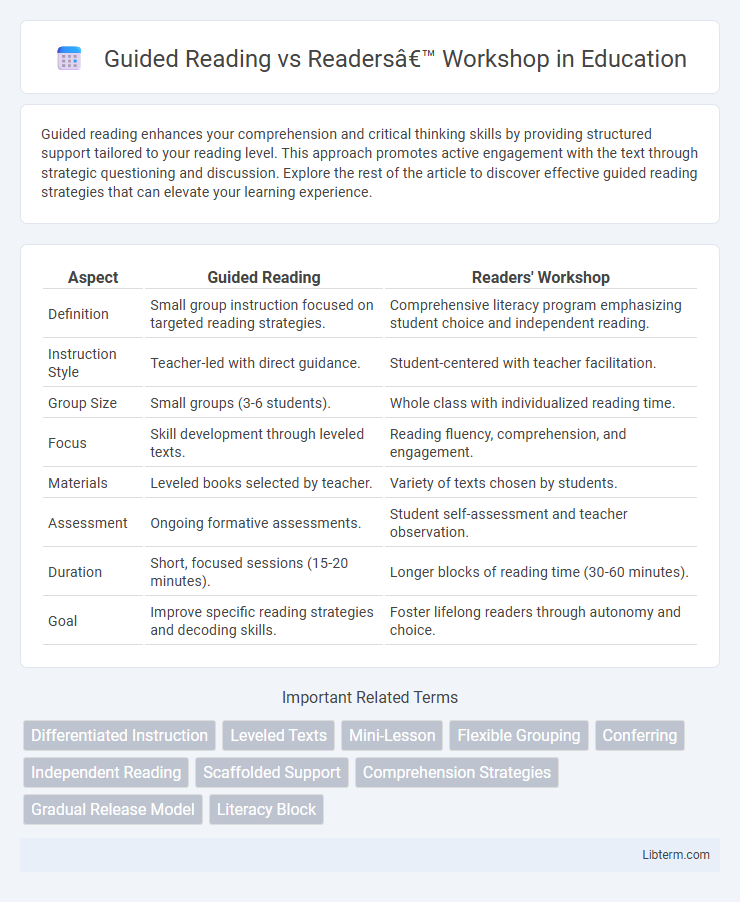Guided reading enhances your comprehension and critical thinking skills by providing structured support tailored to your reading level. This approach promotes active engagement with the text through strategic questioning and discussion. Explore the rest of the article to discover effective guided reading strategies that can elevate your learning experience.
Table of Comparison
| Aspect | Guided Reading | Readers' Workshop |
|---|---|---|
| Definition | Small group instruction focused on targeted reading strategies. | Comprehensive literacy program emphasizing student choice and independent reading. |
| Instruction Style | Teacher-led with direct guidance. | Student-centered with teacher facilitation. |
| Group Size | Small groups (3-6 students). | Whole class with individualized reading time. |
| Focus | Skill development through leveled texts. | Reading fluency, comprehension, and engagement. |
| Materials | Leveled books selected by teacher. | Variety of texts chosen by students. |
| Assessment | Ongoing formative assessments. | Student self-assessment and teacher observation. |
| Duration | Short, focused sessions (15-20 minutes). | Longer blocks of reading time (30-60 minutes). |
| Goal | Improve specific reading strategies and decoding skills. | Foster lifelong readers through autonomy and choice. |
Introduction to Guided Reading and Readers’ Workshop
Guided Reading involves small groups of students working with a teacher on texts tailored to their reading level, promoting targeted skill development and comprehension strategies. Readers' Workshop creates a student-centered environment encouraging independent reading, choice, and literature discussions with minimal teacher intervention. Both approaches aim to improve literacy but differ in structure, with Guided Reading emphasizing direct instruction and Readers' Workshop focusing on autonomy and engagement.
Defining Guided Reading
Guided Reading is a targeted instructional approach where teachers support small groups of students reading at similar levels to develop fluency and comprehension skills. It involves explicit teaching strategies tailored to students' specific reading needs, with controlled text selection to match their capabilities. This method contrasts with Readers' Workshop by emphasizing teacher-guided sessions rather than independent or choice-based reading activities.
Understanding Readers’ Workshop
Readers' Workshop emphasizes student choice, fostering engagement through self-selected reading materials and personalized learning goals. This approach nurtures independent reading skills by allowing students to explore texts at their own pace, promoting deeper comprehension and critical thinking. Guided Reading, in contrast, involves teacher-directed small groups targeting specific reading levels and strategies for skill development.
Key Differences Between Guided Reading and Readers’ Workshop
Guided Reading centers on small, leveled groups with teacher-led instruction targeting specific reading skills and strategies, while Readers' Workshop emphasizes student choice and independent reading within a structured framework. Guided Reading uses precise texts to match readers' abilities, fostering targeted skill development, whereas Readers' Workshop supports holistic literacy growth through self-selected books and peer discussion. Time management in Guided Reading is segmented for focused group sessions, contrasting the flexible, student-driven flow of Readers' Workshop activities.
Instructional Strategies in Guided Reading
Guided Reading employs targeted instructional strategies such as leveled texts, explicit phonics instruction, and strategic questioning to meet students' individual reading needs and foster comprehension skills. Teachers facilitate small-group sessions with a focus on decoding, fluency, and vocabulary development, employing scaffolded support to gradually release responsibility to the reader. This approach contrasts with Readers' Workshop by emphasizing structured skill-building and teacher-directed guidance in reading instruction.
Core Elements of Readers’ Workshop
Readers' Workshop centers on core elements such as mini-lessons that target specific reading strategies, independent reading time that fosters student choice and engagement, and collaborative sharing sessions to build comprehension and critical thinking skills. Guided Reading, by contrast, typically involves teacher-led small groups focusing on leveled texts to support decoding and fluency. Emphasizing student autonomy and differentiated instruction, Readers' Workshop enhances literacy growth through sustained practice and reflective discussion.
Benefits of Guided Reading
Guided Reading offers targeted instruction tailored to individual student needs, enhancing reading comprehension and fluency through small group interaction. It allows teachers to closely monitor progress and provide immediate feedback, fostering personalized skill development. This method effectively supports diverse learners by addressing specific challenges in decoding and vocabulary acquisition.
Advantages of Readers’ Workshop
Readers' Workshop offers personalized learning through flexible grouping and student choice, enhancing engagement and motivation. It fosters critical thinking and comprehension by encouraging authentic discussions and independent reading strategies. The model supports differentiated instruction, making it adaptable to diverse literacy levels within the classroom.
Choosing the Right Approach for Your Classroom
Selecting the ideal literacy instruction method depends on classroom goals and student needs. Guided Reading offers teacher-directed small group sessions tailored to specific reading levels, fostering skill development through targeted instruction. Readers' Workshop emphasizes student choice and independent reading, promoting engagement and motivation by allowing students to explore texts at their own pace.
Integrating Guided Reading and Readers’ Workshop for Maximum Impact
Integrating guided reading and readers' workshop combines targeted, small-group instruction with student choice and independent practice, fostering personalized literacy development. Guided reading provides structured support to address specific skill gaps, while readers' workshop encourages learner autonomy and engagement through diverse texts and strategies. This blend enhances comprehension, fluency, and motivation, creating a balanced, impactful literacy framework tailored to individual needs.
Guided Reading Infographic

 libterm.com
libterm.com